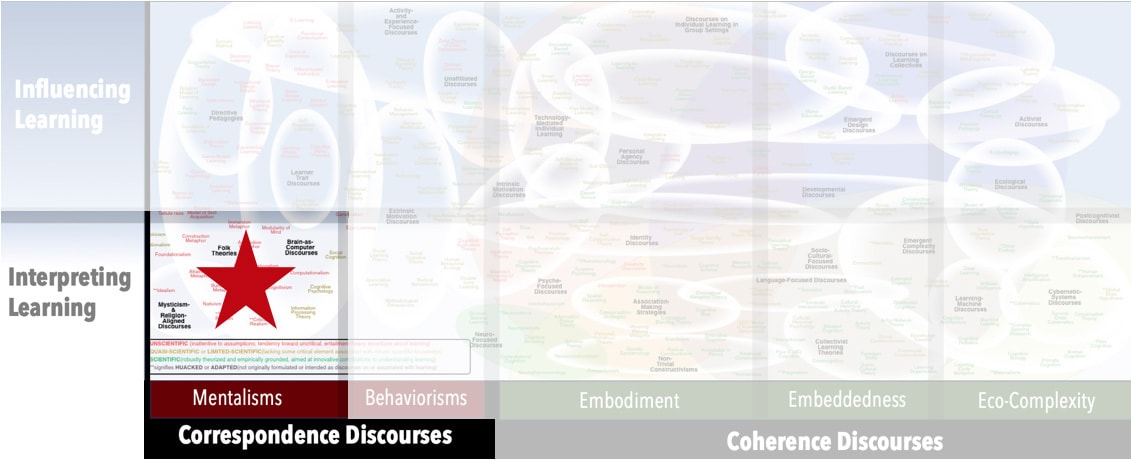AKA
Commonsense Realism
Direct Realism
Perceptual Realism
Focus
Reality independent of knowersPrincipal Metaphors
- Knowledge is … all of external reality
- Knowing is … perceptions of reality
- Learner is … an inner being (insulated and isolated from the world)
- Learning is … perceiving
- Teaching is … conveying
Originated
Ancient (entrenched in the language)Synopsis
Broadly speaking, Realism is the idea that objects exist independent of agents/knowers who might interact with them. That is, the world exists independent of minds.- Absolutism – the perspective that such values as morality, ethics, beauty, and truth are inscribed in reality. Absolutism is founded on the convictions that reality is fixed and truth operates independent of circumstance.
- External Reality Hypothesis (ERH) – the suggestion that physical reality is completely independent of human perception – meaning the universe would be the same whether or not humans were observing it
- Logical Realism (Logical Objectivism; Anti-Psychologism) (Immanuel Kant, 1770s) – a discourse that assert or assumes that logical truths, such as mathematical concepts, exist independently of human thinking
- Naïve Realism (Direct Realism; Phenomenal Absolutism) – the idea that the one’s perceptions of the world are accurate – that is, one’s senses provide direct awareness of the world as it really is. (Contrast: Naïve Idealism, under Idealism.)
- Representationalism (Epistemological Dualism; Indirect Realism; Representationism) – the belief that the world one perceives in one’s mind is not reality, but an internal copy/replica/representation of reality
- Scientific Realism (Bas van Fraassen, 1980s) – the view that ongoing scientific inquiry is sufficient for progressing toward a knowledge of how the universe really is – albeit that needs to adjust and revise “scientific facts” will always be necessary as methods are refined and data are accumulated. Subdiscourses include:
- Structural Realism (James Ladyman, 1990s) – a pared-down version of Scientific Realism that asserts scientific inquiry affords insights into the structure of the universe, but not on its nature
- Speculative Realism (Quentin Meillassoux, 2000s) – a perspective that argues that reality exists independently of human thought and lies outside human experience or comprehension. It aims toward a more objective understanding of reality while shifting discourse away from anthropocentrism. Speculative Realism thus emphasizes the autonomy of objects, the contingency of the universe, and the importance of speculating beyond what humans are able to experience.
- Substantialism – the assumption “reality” is constant and composed of unchanging substances – rather than, for example, dynamic and interacting forces. In the context of educational philosophy, Substantialism is usually associated with the criticisms that it prioritizes objects rather than relations and that it “explains” complex phenomena into cause–effect terms. (Contrast: Materialisms.)
See also Critical Realism and Platonic Realism (Idealism). As well, there are other discourses that use the word “realism,” but that reject the grounding assumption that objects exist independently of actors. Examples include:
- Agential Realism (Karen Barad, 1990s) – the suggestion that objects emerge in one’s interactions with them – or, more accurately, in the intra-actions of the actor and the acted-upon. The perspective draws its inspiration from quantum theory, and its assertions encompass not just the emergence of ideas (i.e., one’s thoughts about and experiences with objects), but the emergence of the actual materiality of objects.
Commentary
Many commentators have noted that, in our most unguarded moments, almost every human is not just a realist, but a naïve realist. We tend to move through the world on the assumption that what we are perceiving is the world as it really is. Phrased differently, Realism prevails among humans – even among the most critical humans. It is the common-sense backdrop of most human activity.Authors and/or Prominent Influences
DiffuseStatus as a Theory of Learning
Realism is usually identified as a philosophy, but it can also be identified as a theory of learning because it has clear and immediate entailments for how one comes to know – namely, taking in a world through the senses.Status as a Theory of Teaching
Realism is not a theory of teaching, but many educational commentators argue that it the belief is evident in much, if not most of contemporary teaching practice.Status as a Scientific Theory
In some senses, Realism is the opposite of a scientific theory. It is certainly not a scientific discourse, although it does serve as the uncritical backdrop for much empirical research.Subdiscourses:
- Absolutism
- Agential Realism
- External Reality Hypothesis (ERH)
- Logical Realism (Logical Objectivism; Anti-Psychologism)
- Naïve Realism (Direct Realism; Phenomenal Absolutism)
- Scientific Realism
- Speculative Realism
- Structural Realism
- Substantialism
Map Location

Please cite this article as:
Davis, B., & Francis, K. (2024). “Realism” in Discourses on Learning in Education. https://learningdiscourses.com.
⇦ Back to Map
⇦ Back to List
